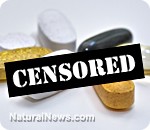Thursday, January 19, 2012 by: Ethan A. Huff, staff writer
 (NaturalNews) Identifying threats to health freedom and freedom of health speech often requires connecting the dots between seemingly unrelated verbiage in one piece of legislation and a trade agreement, for instance, or reading between the lines to identify the full intent or scope of a provision or phrase added to an unrelated bill. And this is the case with the Stop Online Privacy Act (SOPA), which contains language that could one day target websites that sell, promote, or otherwise talk about the benefits of dietary supplements.
(NaturalNews) Identifying threats to health freedom and freedom of health speech often requires connecting the dots between seemingly unrelated verbiage in one piece of legislation and a trade agreement, for instance, or reading between the lines to identify the full intent or scope of a provision or phrase added to an unrelated bill. And this is the case with the Stop Online Privacy Act (SOPA), which contains language that could one day target websites that sell, promote, or otherwise talk about the benefits of dietary supplements.
Section 105 of SOPA, entitled Immunity for Taking Voluntary Action Against Sites that Endanger Public Health, provisions that service providers, network providers, advertising services, search engines, domain name registry services, and other parties that handle internet content will be immune from prosecution should they decide to arbitrarily pull sites that “endanger the public health.”
What is considered an endangerment of public health in SOPA? Websites that offer, sell, dispense, or distribute prescription medications without valid prescriptions, or sites that do the same with prescription medications that have been “adulterated or misbranded,” according to the section. The definitions of “misbranded,” “prescription medication,” “drug,” and “valid prescription,” are also notated with references in the Federal Food, Drug, and Cosmetic Act, and the Controlled Substances Act.
On the surface, these guidelines may seem appropriate as there are many websites out there selling fake prescription drugs to unsuspecting buyers. These drug products often contain harmful additives or other inappropriate ingredients that can make patients sick, or even kill them. So it makes sense to allow service providers to shut these sites down, right?
Regulatory convergences could one day reclassify dietary supplements as ‘drugs’
This is the part where connecting the dots and reading between the lines comes in. Remember back in October when we announced the quiet development of a North American Trilateral Cooperation Charter (TCC) that seeks to integrate the individual dietary supplement regulation guidelines of the US, Mexico, and Canada into a single, “harmonious” regulatory protocol (http://www.naturalnews.com/033892_Trilateral_Cooperation_Charter_health_freedom.html)? Well, based on where this is all headed, dietary supplements could soon be reclassified as “drugs,” or even declared to be “medication” that requires a prescription.
If this sounds a bit crazy, consider the fact that Canada is currently in the ninth round of negotiations with the European Union (EU) to establish a Comprehensive Economic and Trade Agreement (CETA), according to Foreign Affairs and International Trade Canada (FAITA). This agreement will basically standardize trade protocols between the EU and Canada (http://www.international.gc.ca/trade-agreements-accords-commerciaux/agr-acc/eu-ue/can-eu.aspx).
The EU, of course, has already adopted its own Food Safety Directives (EUFSA) that outlawed many dietary and herbal supplements last year, and made many others available by prescription only, as if they are drugs. These directives come from the same authorities that declared late last year that water does not prevent dehydration (http://www.naturalnews.com/034204_water_dehydration.html).
To simplify the situation, if Canada adopts EUFSA through CETA, and the US Food and Drug Administration (FDA) synthesizes US regulatory policy with that of Canada and Mexico, many dietary and herbal supplements now freely available in the US could one day be available by prescription only just as they are in the EU!
This is why any language that targets unapproved or adulterated “prescription medications” is dangerous, especially when that language permits that such targeting can take place outside the rule of law as it does in SOPA. This is just one more reason, of course, why SOPA must be stopped.
Learn more: http://www.naturalnews.com/034695_SOPA_free_speech_health_freedom.html#ixzz1jts0v8l1
'Sec 105 of SOPA threatens freedom of health speech, aligns with FDA Trilateral Cooperation Charter to potentially eliminate access to dietary supplements' has no comments
Be the first to comment this post!